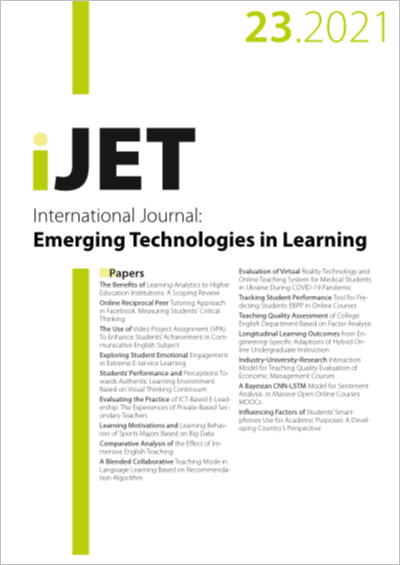Longitudinal Learning Outcomes from Engineering-Specific Adaptions of Hybrid Online Undergraduate Instruction
DOI:
https://doi.org/10.3991/ijet.v16i23.17615Keywords:
Mixed-Mode Delivery, STEM Instructional Frameworks, Modular Instructional Design, Virtualized Active LearningAbstract
Hybrid online delivery, which is also referred to as mixed-mode delivery, utilizes a combination of online content and traditional face-to-face methods which may benefit significantly from specific delivery adaptations for undergraduate engi-neering curricula. Herein, a novel eight-step phased instructional flow with several targeted adaptations is used to accommodate the mixed-mode delivery of STEM curricula is evaluated with a longitudinal study of students afforded these adapta-tions versus those without them. This STEM Blended Delivery Protocol (STEM-BDP) emphasizes scaffolding of analytical procedures along with hands-on prob-lem solving throughout online and face-to-face components equally. Two high enrollment course case studies utilizing STEM-BDP are examined herein, includ-ing an Electrical and Computer Engineering required core undergraduate course and a Mechanical and Aerospace Engineering undergraduate course. The details of the STEM-BDP delivery strategies, learning activities, and student perceptions surveys are presented. Student-resolution longitudinal analysis within a controlled study using blinded evaluation indicates that over a five-year period, failure rates have decreased by 63% among students undergoing STEM-BDP while control and alternatives have not demonstrated similar improvements within the same degree programs. Given increasing enrollments within STEM curricula, it is sought to overcome challenges of conventional lecture-only delivery in high-enrollment courses.
Downloads
Published
2021-12-08
How to Cite
DeMara, R. F., Tian, T., & Howard, W. (2021). Longitudinal Learning Outcomes from Engineering-Specific Adaptions of Hybrid Online Undergraduate Instruction. International Journal of Emerging Technologies in Learning (iJET), 16(23), pp. 171–201. https://doi.org/10.3991/ijet.v16i23.17615
Issue
Section
Papers
License
Copyright (c) 2021 Ronald F DeMara, Tian Tian, Wendy Howard

This work is licensed under a Creative Commons Attribution 4.0 International License.


